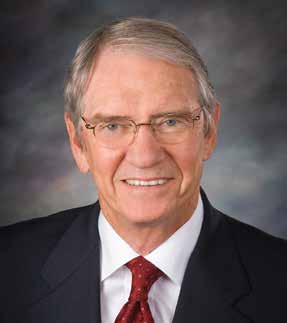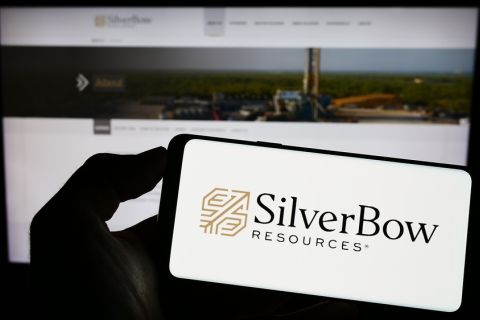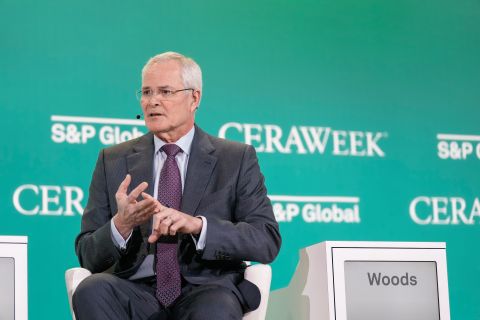[Editor's note: A version of this story appears in the June 2020 edition of Oil and Gas Investor. Subscribe to the magazine here.]
Upon the death of Joe Bill Foster on May 9, the oil and gas industry lost a giant leader of remarkable accomplishment— and a down-to-earth good guy. The tall, Lincoln-esque Foster was always a gentleman in business and in life, intensely loyal, friendly and outgoing. His 31-year career with Tenneco Oil Co. followed by founding Newfield Exploration Co. resulted in relationships with thousands of associates and friends.

I had the good fortune to spend many hours working with Joe on the biography “Something from Nothing: Joe B. Foster and the People Who Built Newfield Exploration Company” (2011).
Foster, 85, passed away at his home in Houston; his death was not COVID-19-related. He is survived by his wife, Harriet, six children, five grandchildren and four great-grandchildren. He was preceded in death by his first wife, Mary Alice.
Fitting to his future career in petroleum, Joe was born in an oilfield camp in Arp, Texas, on July 25, 1934, during the heat of activity on the giant East Texas deposit. At Texas A&M University, he excelled in the Corps of Cadets (Battalion Commander) while pocketing a Bachelor of Science degree in petroleum engineering and a Bachelor of Business Administration degree in general business in 1957. Tenneco recruited Foster at A&M after an unscheduled campus interview. The result: a remarkable 31-year path of success that began in Oklahoma and blossomed when he was assigned to Lafayette, La., and hitched a ride on the booming activity in the Gulf of Mexico.
At Tenneco, he last served as chairman of both Tenneco Oil and Tennessee Gas Transmission Co. Betty Smith, Foster’s longtime executive assistant, recalled, “I thought something was wrong with the oil business if Joe didn’t get promoted every 18 to 24 months.”
In 1988, as parent Tenneco Inc. was looking to exit the oil and gas business, Foster argued for continuing it. But the board disagreed, and the oil and gas assets were auctioned off by Morgan Stanley.
Foster bid for select assets. But outbid, he found himself at 54 unemployed but not destitute. He could pocket his severance, collect dividends on the Tenneco shares he owned and head to the golf course. But he had too much fire in his belly and another surprise venture yet up his sleeve: Newfield.
Operating on the ragged edge
In 1989 Foster and other former Tenneco employees founded the wildcat E&P with $9 million in employee and outside investments, growing the company to 2 Tcfe of proved reserves upon his retirement in 2005.
Newfield was built on the bedrock of Foster’s founding business principles: talented employees, focus, a balance of exploration and acquisitions, an emphasis on technology and teamwork, the mindset of an independent, control of operations and employee ownership.
“When oil prices were in the pits in the late 1980s,” Foster said, “I never hesitated to start a new oil company. I didn’t know whether we would make it or not, but I was very sure that the opportunity would be there for us to do well.”
One of his many business philosophies was to “operate on the ragged edge.”
“To be a success in any business, you must operate 90% of the time at the ragged edge be tween chaos and order, between too little and too much, between comfort and anxiety, if not outright fear,” he said.
Foster lived on the ragged edge during the startup years at Newfield as the company drilled successive dry holes, experienced a capsized rig and was perpetually and precariously short of capital. But the investors and founders did not despair; they had the confidence of teamwork, a solid plan and Foster’s leadership.
Looking back on his years at Newfield, Foster described his pride in the accomplishment: “There is no greater joy in life than starting with nothing and winding up with something. That’s what parents do when they have children,” he said. “That’s what poets and artists do when they create something new and different. And that’s what we did when we created and built Newfield.”
Lifelong contributions to leadership
Foster was always a leader, and this reputation led to his appointment as interim CEO at Baker Hughes Co. in 2000. At the time, the oil and gas sector was mired in yet another painful downturn, and the board at Baker Hughes demanded new leadership.
A Baker Hughes board member since 1992, Foster was set to retire as CEO from Newfield while remaining chairman. He agreed to assume the temporary position but only when he was assured that he had the authority “to do those things that need to be done now.”
Foster helped to right the ship at Baker Hughes. The stock climbed from $17 in January 2000 to $40 by that September.
Foster also made lifelong contributions to leadership on the IPAA and the National Petroleum Council. He was also active on the boards of McDermott International Inc., New Jersey Resources Co. and Targa Resources Co., and he was chairman and senior adviser of private-equity fund TPH Partners LLC.
Howard Newman, a managing director in 1989 of Warburg Pincus that was a second-round investor in Newfield and later co-founded Pine Brook Road Partners, said the investment “was a bet on a very effective and proven CEO, on an experienced and competent management team and on a solid business plan.
“Moreover, all of the founding employees had made a significant investment, and all our interests were aligned.”
Former Newfield board member Dale Zand said, “There’s ‘Joe time,’ and there’s ordinary time. Joe can see and understand a problem 100 times faster than anyone else.”
Foster’s philosophy referenced Rudyard Kipling’s “If—” poem when he said, “If you can meet with Triumph and Disaster and treat those two impostors just the same … Yours is the Earth and everything that’s in it.”
From its start, Newfield’s days were ascetic. For example, office furniture consisted of what founding employees, who were all owners, could put together. Thus, meetings were held at folding card tables complemented with an assortment of lawn chairs.
Spartan use of money was evident in a Wall Street Journal article in the early 1990s in which a Newfield platform in the Gulf was noted for its “kaleidoscope of colors.” The platform was made from spare parts of other platforms; the pieces were blue, red, yellow or gray.
Six-foot Foster and all Newfield employees flew coach class—even to Australia, a 26-hour flight. Investor relations chief Steve Campbell, a 6-foot-4 man, joined Foster in coach on a flight to New York just two days after joining Newfield from Anadarko Petroleum Corp., which had a corporate jet.
Upon landing at LaGuardia at almost midnight—Foster liked to fly after business hours because it allowed you to get in a full day of work in the office—Foster told Campbell, “You know what I like about flying coach? It’s so damn uncomfortable you can get a lot of work done!”
And employees found cabs, not limos. During the company’s 1993 IPO road show, which involved meetings in Boston, New York, Chicago and on the West Coast, Foster said, “There sure is a lot more road than there is show in a road show.”
Bobby Tudor, a Goldman Sachs managing director at the time and later co-founder of Tudor, Pickering, Holt & Co. (TPH) Securities Inc., was a co-manager of the IPO.
The second week, Tudor said, “Look, Joe. We’re going to get limos, and Goldman Sachs will pay for them. It’s not coming out of Newfield’s pocket.” Tudor’s rationale was that arranging the logistics for all of them was just hell on the secretaries.
And, about that IPO, Foster said he thought it might be too soon for Newfield, which had some 100 Bcfe of proved reserves at the time. Newman emphasized that the IPO window was open right then, and it was unknown when it would be open again.
He told Foster, “Joe, you take the cookies when the tray is passed—not just when you’re hungry.”
Foster carried a yellow legal pad to any meeting and made copious notes. Smith, the longtime assistant and a founding Newfield employee, said, “We never ran out of them. That was one of my key jobs: to keep a good supply of yellow tablets.”
In early 1989 while forming Newfield, Foster listed what he would tell the team: Startup pains are normal; Newfield will be data-driven; networking and exposure are essential, but take care that it isn’t taking more time than it is giving back; and we must be prepared to live with failure.
He concluded his list with this: Finally, when we achieve success, we must not let it go to our heads.
______________________________________________________________
Art Smith is the author of Something from Nothing (2011), founder of Triple Double Advisors LLC and led oil and gas research firm John S. Herald Inc. from 1984 through its sale to IHS Markit in 2007.
Recommended Reading
Analysts: Why Are Investors Snapping Up Gulfport Energy Stock?
2024-02-29 - Shares for Oklahoma City-based Gulfport Energy massively outperformed market peers over the past year—and analysts think the natural gas-weighted name has even more upside.
Athabasca Oil, Cenovus Energy Close Deal Creating Duvernay Pureplay
2024-02-08 - Athabasca Oil and Cenovus Energy plan to ramp up production from about 2,000 boe/d to 6,000 boe/d by 2025.
SilverBow Saga: Investor Urges E&P to Take Kimmeridge Deal
2024-03-21 - Kimmeridge’s proposal to combine Eagle Ford players Kimmeridge Texas Gas (KTG) and SilverBow Resources is gaining support from another large investor.
Novo II Reloads, Aims for Delaware Deals After $1.5B Exit Last Year
2024-04-24 - After Novo I sold its Delaware Basin position for $1.5 billion last year, Novo Oil & Gas II is reloading with EnCap backing and aiming for more Delaware deals.
CEO Darren Woods: What’s Driving Permian M&A for Exxon, Other E&Ps
2024-03-18 - Since acquiring XTO for $36 billion in 2010, Exxon Mobil has gotten better at drilling unconventional shale plays. But it needed Pioneer’s high-quality acreage to keep running in the Permian Basin, CEO Darren Woods said at CERAWeek by S&P Global.





